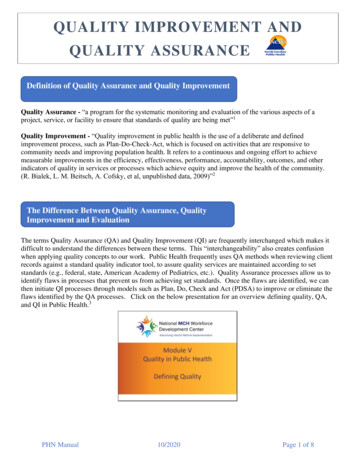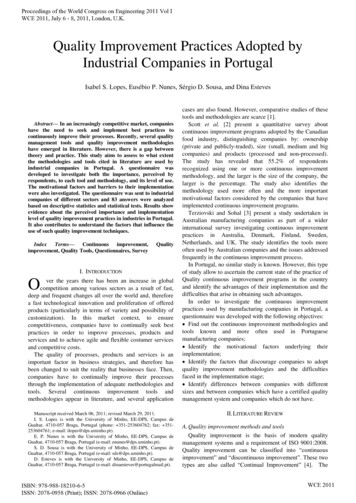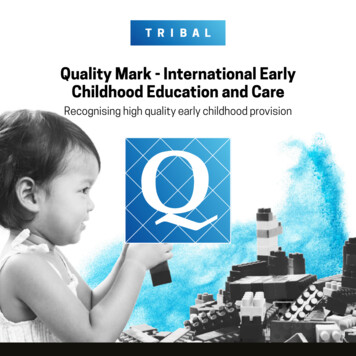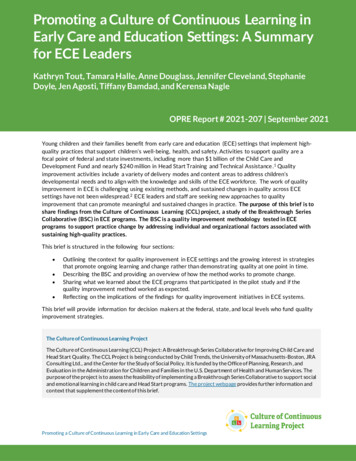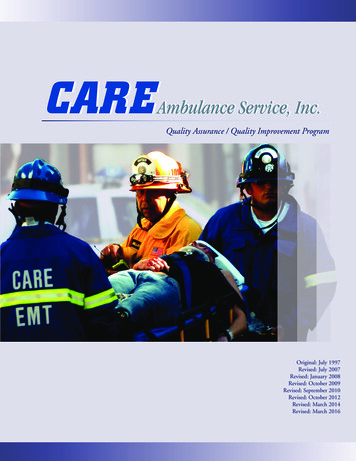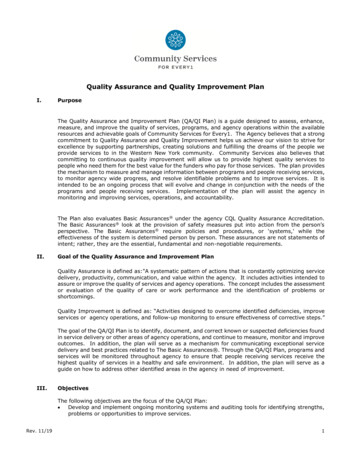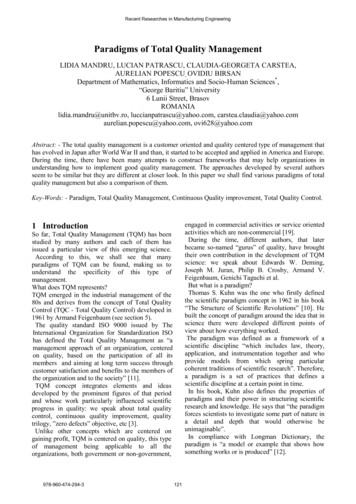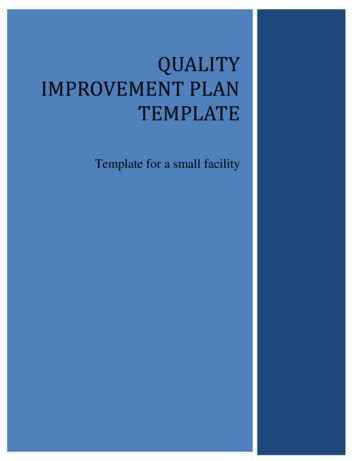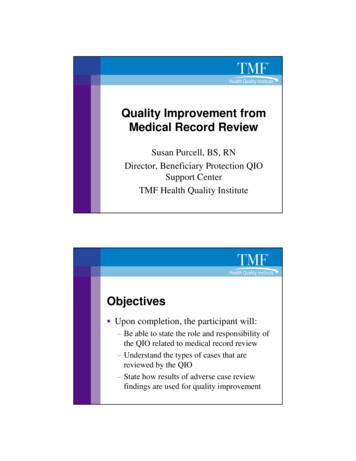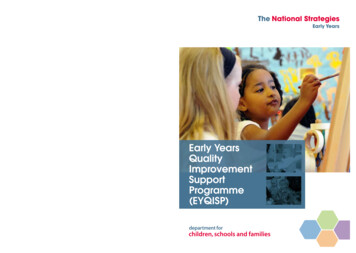
Transcription
Audience: Early Years Practitioners and Early YearsConsultantsDate of issue: 09-2008Ref: 00669-2008BKT-ENCopies of this publication may be available from:www.teachernet.gov.uk/publicationsYou can download this publication and obtainfurther information at: www.standards.dcsf.gov.ukCopies of this publication may be available from:DCSF PublicationsPO Box 5050Sherwood ParkAnnesleyNottingham NG15 ODJTel 0845 60 222 60Fax 0845 60 333 60Textphone 0845 60 555 60email: dcsf@prolog.uk.com Crown copyright 2008Published by the Department for Children,Schools and FamiliesExtracts from this document may be reproducedfor non-commercial research, education or trainingpurposes on the condition that the source isacknowledged as Crown copyright, the publicationtitle is specified, it is reproduced accurately and notused in a misleading context.The permission to reproduce Crown copyrightprotected material does not extend to anymaterial in this publication which is identifiedas being the copyright of a third party.For any other use please use/index.htm80%This publication is printedon 80% recycled paperWhen you have finished withthis publication please recycle itEarly YearsQualityImprovementSupportProgramme(EYQISP)
The National Strategies Early YearsQuality Improvement Support Programme (EYQISP)3Early Years Quality ImprovementSupport Programme(EYQISP)Guidance Tools and Materials to support local authorityEarly Years Consultants and leaders of early yearssettings in quality improvement Crown copyright 200800669-2008BKT-EN
4The National Strategies Early YearsQuality Improvement Support Programme (EYQISP)DisclaimerThe Department for Children, Schools and Familieswishes to make it clear that the Department andits agents accept no responsibility for the actualcontent of any materials suggested as informationsources in this publication, whether these are in theform of printed publications or on a website.In these materials icons, logos, software productsand websites are used for contextual and practicalreasons. Their use should not be interpreted asan endorsement of particular companies or theirproducts.The websites referred to in these materials existedat the time of going to print.ASHFORD COLOUR PRESS 09-2008Please check all website references carefully tosee if they have changed and substitute otherreferences where appropriate.00669-2008BKT-EN Crown copyright 2008
The National Strategies Early YearsQuality Improvement Support Programme (EYQISP)5Early Years Quality ImprovementSupport Programme(EYQISP)ContentsSection 1 Introduction and rationale for the Early YearsQuality Improvement Support ProgrammeSection 2Using the toolsSection 3Planning for quality improvementSection 4Quality Improvement CyclesSection 5Categorising settings and targeting supportSection 6Self Evaluation Audit materials of non-negotiablesSection 7Focused Improvement Plan (FIP) – action planning for quality improvementSection 8Professional Development Meetings (PDMs) – themes and outlinesAppendicesAppendix 1Self Evaluation Audit Format 1Appendix 2Self Evaluation Audit Format 2Appendix 3Focused Improvement PlanAppendix 4Feedback Form Crown copyright 200800669-2008BKT-EN
6The National Strategies Early YearsQuality Improvement Support Programme (EYQISP)Section 11.1 Introduction and rationale for the Early Years QualityImprovement Support ProgrammeThe Childcare Act 2006 places a duty on local authorities and their partners to improve outcomes for allyoung children and reduce inequalities between them. Fulfilling this duty requires a broad andinclusive strategy, part of which should focus on the provision of high quality early learning and care.Children who experience high quality early years provision are well placed to achieve betteroutcomes in school and beyond, and develop better social, emotional and cognitive abilitiesnecessary for life-long learning. Poor quality provision, however, adds no value in the long term.The purpose of the guidance materials in this booklet is to provide local authority Early YearsConsultants (EYCs) and leaders of early years settings1 with tools to support continuous qualityimprovement in line with the principles of the Early Years Foundation Stage (EYFS) Framework andEvery Child Matters. They also draw on the Quality Improvement Programme outlined by theDepartment for Children, Schools and Families, Ofsted self evaluation form (SEF) and the NationalQuality Improvement Network’s principles.These materials form part of the range of information and support for local authorities to use as part oftheir focus on raising and sustaining the quality of early years experiences for children and families.This document provides tools which can be used by EYCs in partnership with settings or independentlyby settings’ leaders. These tools are seen as complementary and/or supplementary to existing localauthority quality improvement processes and systems to support and highlight evidence of selfevaluation. In producing these tools the Early Years National Strategies have worked closely with localauthorities and early years agencies and acknowledge their support.The tools are built on four key principles: the role of effective leadership in securing and improving quality a continuous cycle of self evaluation, improvement and reflection, thus empoweringpractitioners to see themselves as learners, seeking improvements in their practice, reducinginequality and narrowing the achievement gap a system of support and challenge which is transparent and agreed by all strong partnerships between the local authority, settings and each setting’s community.These key principles are explored through the following five elements: strengthening leadership for learning – focusing on the key role of leaders in buildingcapacity and ensuring high quality learning development and provision developing practitioner learning – focusing on the needs and highlighting /developingstrengths of practitioners who support and extend children’s learning and development facilitating partnerships for learning and development – focusing on working in partnershipwith parents/carers, children, other settings and partner professionals to support children’slearning and development1T hroughout this document settings refer to any out-of- home provider of early years provision for children from birth to five, such as childminders, localauthority nurseries, nursery or early years centres, children's centres, play-groups, pre-schools, or schools in the independent, private or voluntary sectorsand maintained schools.00669-2008BKT-EN Crown copyright 2008
The National Strategies Early YearsQuality Improvement Support Programme (EYQISP) supporting progress, learning and development – focusing on using observations to assessand understand children’s learning and development, both in the home and the setting, andtranslating observations of children at play into an assessment of each child’s progress to helpand support them further securing high quality environments for learning and development – focusing on theenabling environment (including the physical and emotional environment), which promoteschildren’s well-being, nurtures children, and fosters positive relationships between children,parents and adults, and where children are valued for their uniqueness and individuality.7Further details of these elements can be found in the Early Years Consultant's Handbook (Reference00127-2008BKT-EN)Quality is the key to securing improved outcomes for children and giving them a better start in theearly years. It is important that all early years settings and providers work in partnership with thelocal authority, parents and the setting’s community to consider how best to create, maintain andimprove continuously their offer to secure better experiences for all young children and theirfamilies.The guidance in this booklet builds on the premise that local authorities work transparently with allsettings in agreeing a differentiated package of support delivered in inverse proportion to success.It is the intention that the tools in this document give a menu of choice to settings and localauthorities to strengthen existing self evaluation and quality improvement processes.The tools include: Categorisation Exemplification Self Evaluation Audits linked to the Ofsted SEF headings Focused Improvement Plans Professional Development Meetings (PDMs), themes and examples Case studies.The National Strategy’s Early Years Consultant's Handbook refers to the importance of localauthorities and children’s trusts planning for continuous quality improvement in the early years. TheNational Strategies’ Early Years field force has a remit to work alongside local authorities in planningfor quality improvement, thus impacting on children’s outcomes and gap narrowing. It is hoped thatthis document will be helpful in this process. Crown copyright 200800669-2008BKT-EN
8The National Strategies Early YearsQuality Improvement Support Programme (EYQISP)Section 2Using the toolsThe following tools have been designed to be used by: EYCs with targeted settings setting leaders with staff teams childminders – individually or in networks/association local authority/children’s trust early years teams.2.1 Categorisation toolsTools for the categorisation of settings are primarily aimed at supporting local authority early yearsteams to share and discuss the levels of support and the deployment of EYCs. They are essential toensuring better targeting of support at settings which need it most, and follow the principle ofoffering support in inverse proportion to success. These tools are based on local authorities havingan open and transparent process which involves settings.2.2 Self Evaluation AuditsThe Self Evaluation Audit tools can be used in partnership settings and the LA’s EYC. In those settingswhere there is limited support from the local authority they can be used equally effectively by thesetting’s own team.These Self Evaluation Audits extend the Ofsted SEF headings to a further level of actionable activitieswhich a setting can work through to secure improvement.2.3 Focused Improvement PlansThis section outlines the action planning cycle and gives tools to support the process as well ascriteria to measure the impact of the actions in raising quality.2.4 Professional Development MeetingsThe Professional Development Meeting themes are examples of possible topics for staff developmentand follow-up activities with an individual setting, clusters of settings or a local network.2.5 Working with schoolsLocal authorities may wish to consider incorporating the tools in this document into their use of theSchool Improvement Programme. This could be as part of their targeted work with identifiedschools or through the wider use of the school improvement cycle and core elements. It could beused to support the leadership of learning and developing practitioner learning. This will offer acomplementary approach to securing sustained improvement in the EYFS.This guidance material builds on the pilots and next steps referred to in Improving outcomes forchildren in the Foundation Stage in maintained schools (Reference 03960-2006BKT-EN).00669-2008BKT-EN Crown copyright 2008
The National Strategies Early YearsQuality Improvement Support Programme (EYQISP)9Section 33.1 Planning for Quality ImprovementThe primary purpose of the quality improvement cycle is to ensure that all settings consider howbest to create, maintain and improve their provision in order to offer the highest quality experiencesfor all young children. It is by doing so on a continuous basis that they can secure the best possibleoutcomes for all young children as set out in the Every Child Mat
Quality Improvement Support Programme (EYQISP) Section 1 1.1 Introduction and rationale for the Early Years Quality Improvement Support Programme The Childcare Act 2006 places a duty on local authorities and their partners to improve outcomes for all young children and reduce inequalities between them. Fulfilling this duty requires a broad and
